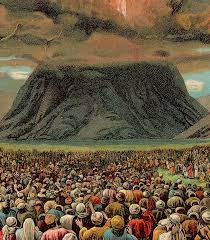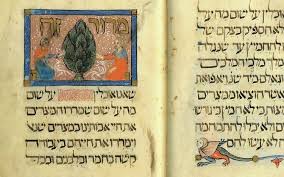An article I wrote about Shavuos appears at Religion News Service, here.


An article I wrote about Shavuos appears at Religion News Service, here.

The average price paid to climb Mt. Everest – for permits, equipment and guides – is between $35,000 and $45,000. And hundreds have died in that exploit.
What impels people to undertake so expensive and dangerous a quest? A misguided search for meaning.
Philosophers argued about what ultimately motivates humans. Nietzsche said power; Freud, pleasure.
Both tapped into something real. The power to, through our choices, change our lives and history, is a manifestation of gevurah, “strength.” In Jewish eyes, though, that doesn’t mean subjugating others; rather, as Ben Zoma in Avos (4:1) defines it, “hakovesh es yitzro,” one who, by force of will, overcomes his nature.
And Freud was on to something too; the Ramchal begins Mesilas Yesharim with the surprising statement that the goal of life is the pursuit of pleasure. Not physical, but rather ultimate, pleasure: “basking in the radiance of the Shechinah.”
The Danish thinker Søren Kierkegaard was insightful. He wrote of the human “will to meaning” – the yearning to achieve something truly meaningful as life’s ultimate goal.
Some imagine “meaning” in climbing Everest. Others envision meaningful accomplishment in meriting mention in the Guinness Book of World Records, for, say, the most slices of pizza eaten while riding a unicycle and simultaneously juggling balls.
For those who recognize our divine mandate, though, the ring for which to reach is a spiritual one, achieved through Torah and mitzvos.
All good fortune to the Everest climbers.
Come Shavuos, we look to a different mountain.
© 2023 Rabbi Avi Shafran

The Baitusim, a sect in Talmudic times often associated with the Tzedukim (or Sadducees), had a congenial approach to establishing the date of Shavuos, which the Torah describes as the fiftieth day from a particular point (Vayikra 23:15-21).
The Sinaic mesorah defines that starting point as the second day of Pesach (designated by the Torah as “the day after the Shabbos” – “Shabbos” here meaning the first day of the holiday), the day the omer sacrifice was brought. Thus, Shavuos could fall on any day of the week.
But the Baitusim seized on the Torah’s reference to that first day of counting as “the day after the Shabbos” as indicating that the fifty days must start after a literal “Shabbos,” on a Sunday, the first one after the omer, ensuring that Shavuos, too, would always fall on an Sunday.
A Baitusim spokesman defended his group’s position to Rabban Yochanan ben Zakkai: “Moshe, our teacher, loved the Jews and… established [Shavuos] after Shabbos, so that the Jewish people would enjoy themselves for two days” (Menachos, 65a).
Hashem, he was asserting, certainly wanted His people to have a “long weekend” each summer.
An enticing thought, perhaps. But not what Hashem commanded. And Judaism is all about doing what He commands, whether it sits well with us or we think we have a better, “improved” idea. It isn’t our prerogative to “reform” divine will.
Our mandate is to be tamim, “simple,” “perfect,” “trusting.” It was, after all, our ancestors’ declaration of Na’aseh vinishma, “We will do and [only then endeavor to] hear [i.e.understand]” that earned us the Torah.
Which declaration, of course, took place, according to the mesorah, on Shavuos.
As Rava told a heretic who ridiculed his alacrity, “We Jews proceed with simple purity, as it says [in Mishlei 11:3], ‘The simplicity of the upright will guide them” (Shabbos 88b).
Notes the Shem MiShmuel: The “seven weeks” that are counted from Pesach to Shavuos are pointedly called sheva Shabbasos temimos – “seven perfect weeks.” Weeks, the word is hinting, for us to grow in what merited us the Torah, our temimus.
© 2023 Rabbi Avi Shafran

A piece adapted from an essay to be included in a Haggadah due to be released next year, appears at Religion News Service, here.

A piece I wrote to help set the record straight about the hospital “Chametz Law” passed by the Knesset was published by Forward. It can be read here.

The account of Moshe’s being placed in the river, discovered by bas Par’oh and raised in royal surroundings would seem to be of no import regarding the main narrative of Shemos – Moshe’s killing the Mitzri, fleeing as a result to Midian and being charged by Hashem with his mission.
Ibn Ezra, though, suggests that it is very much part of the larger story. He writes that “Perhaps Hashem arranged things so that Moshe would grow up in a royal house and his spirit would thereby be exalted” and he would “not possess a base spirit used to being in the house of slaves.”
That, he continues, was necessary for Moshe to be able to kill the Mitzri and intercede to help Yisro’s daughters (and, I might also suggest, to be able to receive nevu’ah, which requires a state of contentment).
Which makes for a delicious irony: Par’oh’s decree to kill baby boys is what required baby Moshe to be placed in the river, which resulted in his being raised as a royal, which allowed him to become the agent of Klal Yisrael’s geulah, the very thing Par’oh had sought to undermine.
“Many thoughts are in a man’s heart, but it is Hashem’s plan that will persevere” (Mishlei 19:21). It has been said that the intent of that pasuk is that those very thoughts of man can be the vehicle for the fruition of Hashem’s plan.
We see that not only in Par’oh’s ultimately self-undermining decree but in the narrative that ended Sefer Beraishis. As Yosef reassured his brothers about their plotting against him, which resulted in his elevation in Mitzrayim and his becoming the provider of food to the the nation and his family: “Indeed, you intended evil against me, [but] Hashem designed it for good, in order to bring about what is at present to keep a great populace alive.”
We read these parshios after Chanukah, on the path to the next Jewish holiday, Purim. There couldn’t be anything more Purim-centric than the irony of how best-laid plans can themselves bring about the opposite of the plotters’s wish: “Hashem’s plan.”
© 2023 Rabbi Avi Shafran

Former Vice President Mike Pence has added to his sins — to date, they include calling his childrens’ mother “mother” and declining to dine privately alone with any woman other than his spouse — a deeply offensive (at least to some) menorah.
Read all about it here.

An oldie about Chanukah that appeared in the New York Times can be read here.

I used to pass the fellow each morning as I walked up Broadway in lower Manhattan on my way to work. He would stand at the same spot and hold aloft, for the benefit of all passers-by, one of several poster-board signs he had made. One read “I love you!” Another: “You are wonderful!” The words of the others escape me, but the sentiments were similar.
He looked normal and was decently dressed, and he smiled broadly as he offered his expressions of ardor to all of us rushing to our offices. I never knew what had inspired his mission, but something about it bothered me.
Then one day I put my finger on it. It is ridiculously easy to profess love for all the world, but it is simply not possible. Gushing good will at everyone is offering it in fact to no one at all.
By definition, love must exist within boundaries, and our caring for those close to us is of a different nature than our empathy for others with whom we don’t share our personal lives. What is more, only those who make the effort to love their immediate families and friends have any chance of truly caring, on any level, about others.
Likewise, those with the most well-honed sense of concern for their own communities are the ones best suited to experience true empathy for people outside of their communal worlds.
It’s an appropriate thought for this time of Jewish year, as Sukkos gives way, without a second’s pause, to Shemini Atzeres.
Sukkos, interestingly, includes something of a “universalist” element. In the times of the Beis Hamikdash, the seven days of Sukkos saw a total of seventy parim offered on the mizbeiach, corresponding, says the Gemara, to “the seventy nations of the world.”
The families of people on earth are not written off by our mesorah. A mere four days before Sukkos’s arrival, on Yom Kippur, we read Sefer Yonah. That navi was sent to warn a distant people to repent, saving them from destruction. The Sukkos parim, the Gemara informs us, brought divine blessings down upon all the world’s peoples. Had the ancient Romans known just how greatly they benefited from the merit of karbanos, Chazal teach, they would have placed protective guards around the Beis Hamikdash.
And yet, curiously, Sukkos’s recognition of humanity’s worth is juxtaposed with Shemini Atzeres, which expressed Hashem’s special relationship with Klal Yisroel.
The famous parable:
A king invited his servants to a large feast that lasted a number of days. On the final day of the festivities, the king told the one most beloved to him, “Prepare a small repast for me so that I can enjoy your exclusive company.”
That is Shemini Atzeres, when Hashem “detains” the people He chose to be an example to the rest of mankind, when, after the seventy parim of the preceding seven days, a single par, corresponding to Klal Yisroel, is brought on the mizbeiach.
We Jews are often assailed for our belief that Hashem chose us from among the nations to proclaim His existence and to call on all humankind to recognize our collective immeasurable debt to Him.
And those who are irritated by that message like to characterize the special bond Jews feel for one another as hubris, even as contempt for others.
The very contrary, however, is the truth. The special relationship we Jews have with each other and with HaKodosh Boruch Hu, the relationships we acknowledge in particular on Shemini Atzeres, are what provide us the ability to truly care – not with our mere lips or poster boards – about the rest of the world. They are what allow us to hope – as we declare in Aleinu thrice daily – that, even as we reject the idolatries that have infected the human race over history, one day “all the peoples of the world” will come to join together with us and “pay homage to the glory of Your name.”
© 2022 Ami Magazine

“They are My servants, whom I freed from the land of Egypt” (Vayikra 25:55).
Although the Talmud’s comment on the phrase “They are My servants” – “but not the servants of servants” (Bava Kamma 116b) – has a technical, halachic meaning, it also hints at a broader one.
In other words, not only does it say that a Jew cannot own another Jew, it also signals that Jews are not to indenture themselves to causes other than the Jewish mandate. Not to a political party, social cause or personality. A Jew’s exclusive ultimate role is to be a servant of Hashem.
Because the freedom we were divinely granted from Egyptian bondage was not what many consider “freedom” – libertinism, the loss of all fetters. It was a passage from being “servants to servants” – to Egyptians and Egyptian mores – to becoming servants of Hashem. As Moshe, in Hashem’s name, ordered Pharaoh: “Let my people go so that they may serve Me” (Shemos 9:1).
The Hebrew word for freedom, cherus, the Mishna (Avos, 6:2) notes, can be vowelled to render charus, “etched,” as the Aseres Hadibros were on the luchos. “The only free person,” the Mishna concludes, “is the one immersed in Torah.”
True freedom doesn’t mean being retired and moneyed, lying on a beach with sunshine on one’s face and a cold beer within reach, without a care or beckoning task.
In the words of Iyov, “Man is born to toil” (5:7). True freedom, counterintuitively, comes from hard work. Applying ourselves to a higher purpose liberates us from the limitations of our inner Egypts, and is what can bring true meaning to our lives.
Indian poet and Nobel laureate Rabindranath Tagore wrote:
“I have on my table a violin string. It is free to move in any direction I like. If I twist one end, it responds; it is free.
“But it is not free to sing. So I take it and fix it into my violin. I bind it, and when it is bound, it is free for the first time to sing.”
A timely metaphor, as we progress from Pesach, the holiday of our release from bondage, to Shavuos, the day we entered servitude to the Divine. And when, like on Pesach, we will sing the words of Hallel.
© 2022 Rabbi Avi Shafran